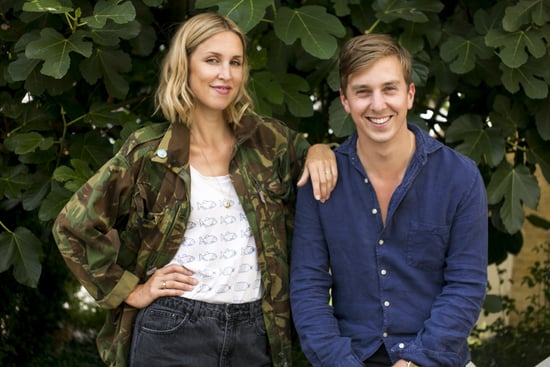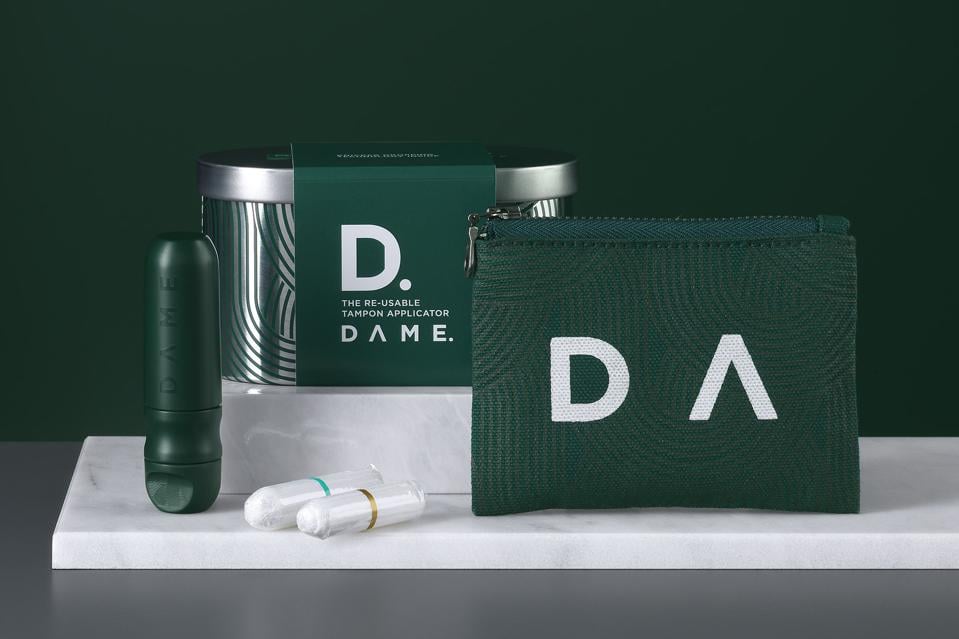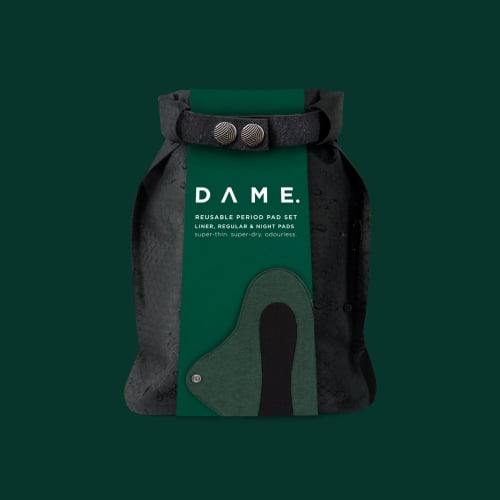 [0]
[0]
Dame [1] is the British brand behind the world's first reusable tampon applicator, which has saved approximately 3 million plastic applicators from landfills to date. In celebration of National Period Day, we spoke to founders Alec Mills and Celia Pool on how they founded their sustainable period care brand, how we can take the stigma out of periods, and how to be a little kinder to the environment.
"Bleed red, think green" is Dame's motto, and very well so. In the UK, period products are not only the fifth most commonly found item on beaches, but each year more than 4.3 billion disposable products are used, with 1.3 billion being plastic tampon applicators. Every menstruating person uses over 11,000 pads and/or tampons in their life, which equals about 200 kg. of products ending up in landfills (just one box of conventional tampons contains almost as much plastic as five carrier bags). These stats are shocking, but Dame is changing the narrative with healthier periods — both for the body and the environment.
The brand has made incredible strides in the period products category since it launched just two years ago. It is now stocked at Selfridges as part of the store's sustainable initiative, Project Earth, and last month, Pool was awarded the Bold Future Award by Veuve Clicquot for her contributions to the sustainable industry. Dame is also a B Corp [2], their cotton is GOTS certified [3] and climate positive, and it is the first brand in the feminine care sector to receive the Carbon Neutral Plus certification. Keep reading to hear, in their own words, how Pool and Mills brought this innovative and game-changing brand to life.
POPSUGAR: What was the "aha" moment for setting up your first brand, Sanitary Owl, which eventually turned into Dame?
Celia Pool: It was not long after I'd had my first child and realised that I didn't have any tampons in the house, I had to then get me and my new baby dressed, go out in the pouring rain to buy them. One night at supper I sat next to a friend [Alec] and we somehow got chatting about tampons, the ways in which they were sold, and the negative discourse that still surrounds menstruation.
By the next morning we had created a subscription business selling popular brands of disposable and reusable menstrual products in the post. Our aim was to offer more convenience and choice and we ran this as Sanitary Owl for a few years. However, we went further down the rabbit hole and discovered that these products are not regulated in the EU. The majority are single use, filled with plastics and synthetics, and have subtle-yet-harmful messaging (why do I need to be "discreet"?). The reusable options available were great, but no one was really buying them. When we found out that 100 billion period products are thrown away every year and most of these cannot be recycled, we knew we had to move fast. We then decided to pivot our business to produce sustainable period products only, and our world-first Dame Reusable Tampon Applicator [4] was created.
 PS: We were so shocked to find out so many people flush their period products! How do you think we can change and educate people even if they don't want/aren't ready to make a sustainable switch?
PS: We were so shocked to find out so many people flush their period products! How do you think we can change and educate people even if they don't want/aren't ready to make a sustainable switch?
CP: Bringing that conversation out into the open, and into schools is key. Educating children (and adults) that your toilet is not a bin. But not only that, but by taking the shame away from these products, [it] means that people are less likely to want to hide or dispose of them in places where they should never be put.
PS: Your sustainable practices are unparalleled — why did you decide to go down that route with your brand?
Alec Mills: Once we decided to pivot the business and help change the face of reusables, we knew we wanted to go all in. We're proud to be a certified B Corp company, which means that we believe in the power of business as a force for good. It's the only certification out there that measures a business's entire social and environmental impact. Decision-making suddenly becomes so much easier knowing that we have this accountability. We partnered with women's empowerment programmes to make our Dame travel applicator wallets, donate product to charities, and reduce or reuse our waste wherever possible. We were also the first period company to become carbon positive.
PS: The applicator is of course your hero product. Tell us a bit about your latest launch of reusable pads?
CP: I am so pumped about our Dame Reusable Pads [5]. I was always a bit of a pad-hater from my teenage days, as I found the user experience pretty demoralising. However after having a baby I had to use them, and when we found out that a single disposable pad has the equivalent of 4 shopping bags worth of plastic in it, we knew we wanted to have a crack at making a better version of a reusable pad. Our patent-pending technology makes the pad super dry, super soft, odour-neutralising, and easy to wash. Plus, going reusable is so much cheaper in the long run. The bonus for me is that I no longer need to walk around sounding like I have a plastic bag rustling between my legs.
 [6]
[6]
PS: It makes us so happy to see Selfridges recognise your sustainability efforts, congrats! Is this something you wanted to do since founding your brand?
CP: Selfridges is a great partner, as they have been championing sustainability for a while. One of our key pillars of our brand is acceptability. We need to take this topic out from its hiding place in the bathroom cupboard and allow it the same visibility as other similar products. Getting your period is a normal fact of life for nearly half the global population. By maintaining this shroud of secrecy, this subtle negative language, we are harming the way young girls view this important part of their life.
PS: Why is there still stigma surrounding periods, and how do you think we can improve on that?
CP: Period shame is deeply embedded in our society. Whereas in the UK it might be displayed in hiding tampons up sleeves when going to the bathroom, in some countries women are banned from the kitchen, place of worship, or even required to stay home during the week they are menstruating, as they are believed to be "unclean." While these examples are at different ends of the spectrum, none of them should be happening. Acceptability around menstruation is key. We cannot let future generations grow up believing this natural bodily function is anything but normal.
PS: There's a misconception that being sustainable is always more expensive. What would you like people to know about this, and how can this myth be debunked?
AM: It's tough because sometimes it is more expensive. Paying a fair price for goods or labour means that often the price has to be passed onto the customer. As a consumer, we need to get comfortable with that and begin to consume less. This is where reusables can be great. With a set of our pads, it starts saving you money after 18 months.
PS: Could you tell us your top three tips if someone wants a more sustainable period, but they don't know where to start – apart from getting your period applicator of course!
CP: Firstly, think about what products you currently use and are comfortable with. Like with most things, it is much easier to take a small step than a giant leap. Secondly, look for the reusable alternatives. If you use disposable pads, then check out reusable pads or period pants. If you use disposable applicator tampons, check out menstrual cups or reusable applicators. If you still want to use disposables, then do your research. When a brand tells you it is organic or biodegradable, check it is 100 percent, otherwise there is no point. Thirdly, talk about it with your friends. We need to be more open with this, otherwise change will be too slow.
PS: You do a lot of work campaigning against period poverty. Can you share some simple steps for people to support this very important cause?
CP: Donate and raise awareness, but also realise this is a much deeper issue that goes beyond just money and the current climate. As soon as society acknowledges that your period is not a choice, that it is not a "luxury" (as the tampon tax would have it) and that these are essential products, the better. Menstruation needs to be normalised. The detrimental effect of girls missing out on school or work is not something that is confined to lockdown. It is a systemic problem that needs to be corrected.
PS: What are the most important pillars for founding a sustainable brand for you?
AM: Our customers and our team; they are our guiding light and who we feel accountable to.
PS: You're probably the only period brand that has received a design award for their packaging. Can you tell us a bit more about the design process and why this was important for you? AM: Thank you! One of the key things for achieving our goal of making periods acceptable was to change the way people viewed these products. We wanted it to be packaging that people were happy to have on their bathroom shelf/desk/bag. So colour, font, and style was incredibly important — and not just that, but also the materials that we used or reused. Our tin is designed to keep your tampons in, and our postal boxes are boxes that have been given a second life because we believe that the world does not need another Amazon box.
PS: What have been the hardest moments since founding Dame? CP: There have been many! It's not easy to start a business. There are so many bumps along the road where you are figuring things out and making a lot of mistakes. Pivoting the business was a real challenge. Having to go to our investors and say that we no longer believed in the synthetic single-use products that we were selling, and we wanted to design our own, was a big thing. We had a lot to prove, and we were very lucky that they were so supportive and believed in what we were doing. But it did mean that we had to deliver, and designing a product is not a quick thing. It took us two years to get it to market.
PS: How did you finance Dame? AM: In the spring of 2018 we launched our Kickstarter campaign, which allowed us to prove market validation. We were blown away by the response. We trended on Twitter, hit our funding target on day three of our 30-day campaign, and ended up overfunding by nearly 300 percent. It was a big relief to be able to go back to our investors, not only to show that we were on the right track, but that we had money to go into production. It has given us the most amazing group of customers, who have been instrumental in providing feedback since.
PS: What's your biggest achievement in the two years of Dame?
AM: Our ultimate goal is to get as many people using reusables as possible, and that doesn't even need to be our products. When we launched two years ago, we had no idea how people would react. We've been blown away by the response, selling in over 60 countries, having all the major UK retailers approach us to stock the product, and winning a prestigious Dezeen design award. Finding out that big names such as Emma Watson [7] and Anaïs Gallagher not only use our products, but talk about them, through no effort of our own, is mind-boggling. But for us, that number of people switching is still the key achievement. We know we've still got a long way to go.